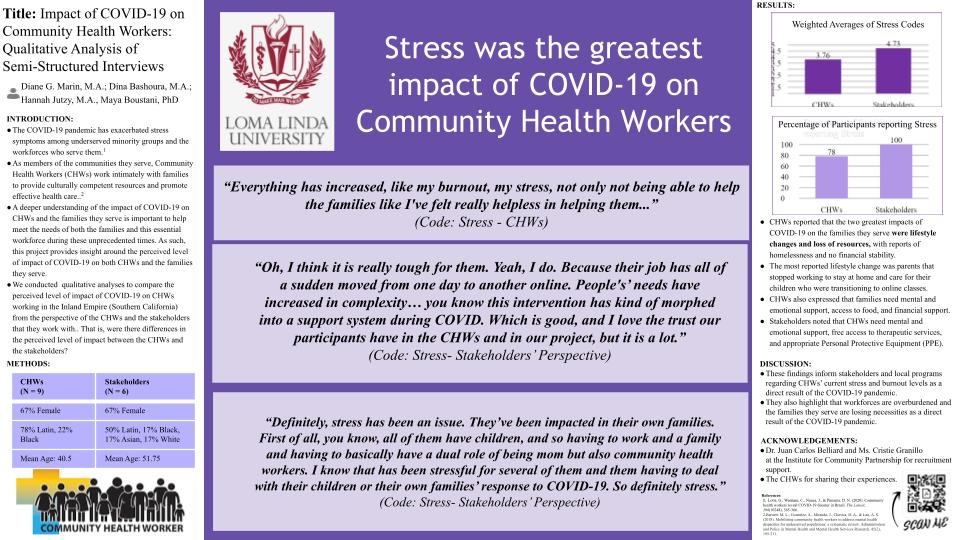Impact of COVID-19 on Community Health Workers: Qualitative Analysis of Semi-Structured Interviews

Introduction. The COVID-19 pandemic has exacerbated stress symptoms among underserved minority groups and the workforces who serve them. As members of the communities they serve, Community Health Workers (CHWs) work intimately with families to provide culturally competent resources and promote effective health care. A deeper understanding of the impact of COVID-19 on CHWs and the families they serve is important to help meet the needs of both the families and this essential workforce during these unprecedented times. As such, this project provides insight around the perceived level of impact of COVID-19 on both CHWs and the families they serve. Methods. Individual semi-structured interviews were conducted with nine Community Health Workers (78% = Latin, 67% = Female) and six stakeholders (supervisor, director, academy trainer, 67% = Female). The first author reviewed the transcripts and used open coding to create a codebook based on common themes. Next, two graduate students used the codebook to code the transcripts’ excerpts. The ‘Impact on CHW-stress’ codes were weighed on a scale from 1-5 (1 = stress is better, 3 = stayed the same, 5 = worse stress). Finally, all three met to solve inconsistencies through consensus coding. Results. Qualitative data analysis revealed that one of the greatest impacts of COVID-19 on CHWs was stress. Seventy-eight percent of CHWs reported higher levels of stress as a direct result of COVID-19. CHWs also reported increased demands to their position while coping with the unpleasant consequences of the pandemic on their personal lives. All stakeholders also reported higher levels of stress on CHWs as a direct result of COVID-19 on CHWs. Further data analysis using weighted averages of codes revealed higher perceived levels of stress reported by stakeholders CHWs (M = 4.73) compared to perceived levels of stress reported by CHWs (M = 3.76). Stakeholders also reported higher frequency of stress (n = 18) compared to reports by CHWs (n = 12). In addition, CHWs reported that the two greatest impacts of COVID-19 on the families they serve were lifestyle changes and loss of resources, with reports of homelessness and no financial stability. The most reported lifestyle change was parents that stopped working to stay at home and care for their children who were transitioning to online classes. CHWs also expressed that families need mental and emotional support, access to food, and financial support. Stakeholders noted that CHWs need mental and emotional support, free access to therapeutic services, and appropriate Personal Protective Equipment (PPE).Discussion. These findings inform stakeholders and local programs regarding CHWs’ current stress and burnout levels as a direct result of the COVID-19 pandemic. They also highlight that workforces are overburdened and the families they serve are losing basic necessities as a direct result of the COVID-19 pandemic. Recommendations for programs working with CHWs are to provide greater mental health support including possible stress and burnout interventions that will help reduce stress and improve mental well-being in this workforce.


